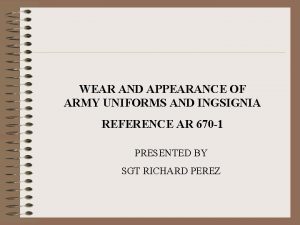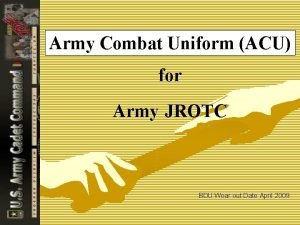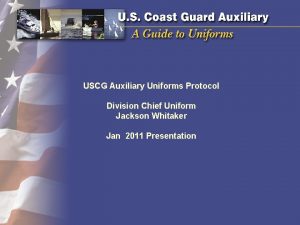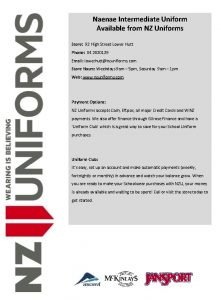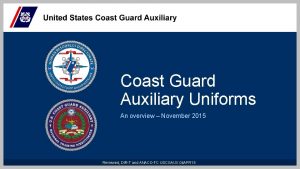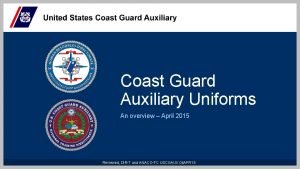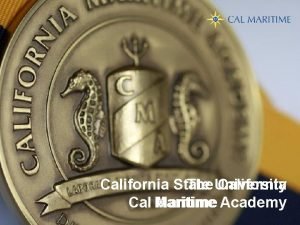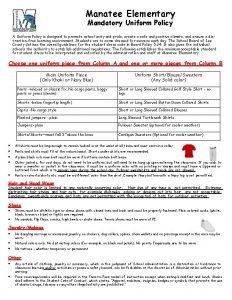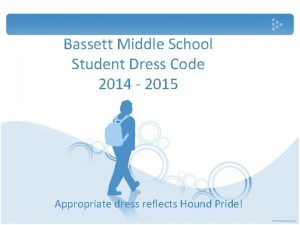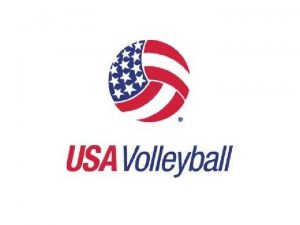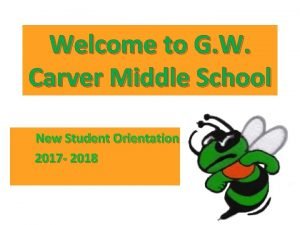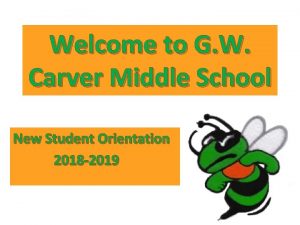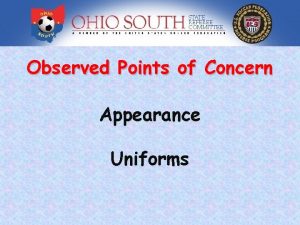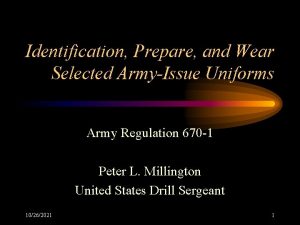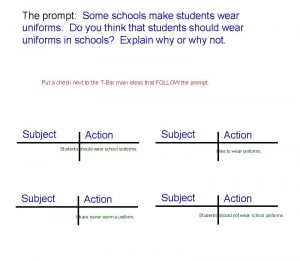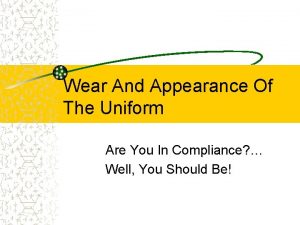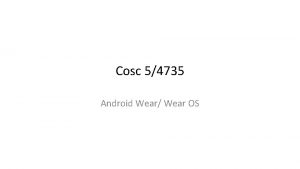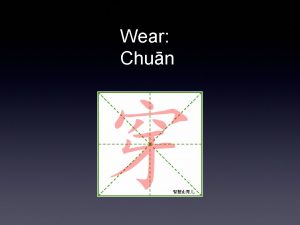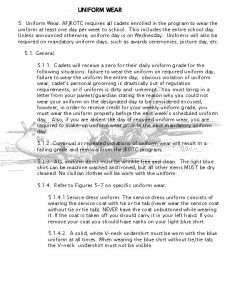WEAR AND APPEARANCE OF ARMY UNIFORMS AND INGSIGNIA























- Slides: 23

WEAR AND APPEARANCE OF ARMY UNIFORMS AND INGSIGNIA REFERENCE AR 670 -1 PRESENTED BY SGT RICHARD PEREZ

TASK: TO BREAKDOWN THE ARMY SERVICE UNIFORM TO ITS BASICS CONDITIONS: GIVEN A CLASS ROOM ENVIRONMENT AND A GROUP OF HIGHLY MOTIVATED SOLDIERS STANDARDS: TO ENSURE EACH SOLDIER CAN PROPERLY IDENTIFY DEFICIENCIES USING THE KNOWLEDGE THEY HAVE LEARNED IN CLASS.

ENLISTED ARMY GREEN SERVICE UNIFORM Click here for break down (MALE & FEMALE) MALE/FEMALE) Click here for description of the Army Green Service Uniform

ARMY GREEN SERVICE UNIFORM BASIC BREAKDOWN (MALE/FEMALE)

DESCRIPTION COMPOSITION. The Army green dress uniform (authorized for enlisted personnel only) comprises the Army green coat and trousers, a commercial long-sleeved white shirt, and a black four-in-hand tie (before retreat) or a black bow tie (after retreat). The black beret is authorized for wear with this uniform. When the enlisted Army green dress uniform is worn for evening social occasions (after retreat), headgear is not required. Combat boots and organizational items, such as brassards and military police (MP) accessories, are not authorized for wear with the Army green dress uniform. All other accessories and insignia that are authorized for wear with the class A service uniform are authorized for wear on the Army green dress uniform. COAT, ARMY GREEN: GENERAL DESCRIPTION. The coat is a single-breasted, peak-lapel, four-button coat extending below the crotch, fitting easily over the chest and shoulders, with a slight draped effect in the front and back. The coat is fitted slightly at the waist, conforming to body shape without tightness and with no prominent flare. TROUSERS, ARMY GREEN: GENERAL DESCRIPTIOIN. The trousers are straight legged without cuffs, and with side and hip pockets. The left hip pocket has a buttonhole tab and button.

HOW WORN BRANCH INSIGNIA (MALE/FEMALE) Male enlisted personnel. On the Army green, blue, and white coats, enlisted males wear their branch insignia centered on the left collar, with the bottom of the disk approximately 1 inch above the notch, with the centerline of the insignia parallel to the inside edge of the lapel. Female enlisted personnel. On the Army green coat and the new versions of the Army blue and white coats, enlisted females wear their branch insignia on the left collar. The insignia is worn so the bottom of the disk is centered between the outside point and inside edge of the collar, approximately 5. 8 inch up from the notch, with the centerline of the branch insignia parallel to the inside edge of the lapel.

HOW WORN U. S. INSIGNIA (MALE/FEMALE) Male Enlisted On the Army green, white, and blue uniform coats, the bottom of the U. S. insignia disk is placed approximately 1 inch above the notch, centered on the right collar, with the centerline of the insignia parallel to the inside edge of the lapel. Female Enlisted On the new versions of the white and blue uniform coats, and on the Army green coat, the bottom of the U. S. insignia disk is centered on the right collar, approximately 5. 8 inch up from the collar and lapel seam, with the centerline of the insignia parallel to the inside edge of the lapel.

NON-SUBDUED GRADE INSIGNIA (MALE/FEMALE) Enlisted non-subdued cloth grade insignia is sewn on each sleeve of the Army green, blue, and white uniform coats, and on each sleeve of the mess and evening mess jackets. Insignia with a green background is worn on the Army green uniform coat; insignia with a white background is worn on the white uniform coat, and on the white mess and white evening mess jackets. Insignia with a blue background is worn on the Army blue coat, and on the blue mess and blue evening mess jackets. Enlisted personnel may wear either the large- or small-size insignia. How Worn The insignia is worn centered between the shoulder seam and elbow on all uniform coats. When the position of the shoulder sleeve insignia (SSI) does not allow for proper placement of the grade insignia as stated above, the grade insignia is placed 1. 2 inch below the SSI, on the left or right side of the coat, as applicable.

WEAR OF DISTINCTIVE UNIT INGSIGNIA (MALE/FEMALE) Enlisted personnel wear the DUI on the green service uniform coat, centered on the shoulder loops an equal distance from the outside shoulder seam to the outside edge of the button, with the base of the insignia toward the outside shoulder seam. Enlisted personnel are not authorized to wear the DUI on the enlisted green dress uniform (worn with white shirt and necktie/neck tab). Officers wear the DUI centered on the shoulder loops, an equal distance from the inside edge of their grade insignia to the outside edge of the button, with the base of the insignia toward the outside shoulder seam.

NAME PLATE (MALE/FEMALE) Nameplate Description. (a) The nameplate is a black, laminated plastic plate, 1 inch by 3 inches, 1/16 inch thick, with a white border not to exceed 1/32 inch in width. Lettering is block type, indented white lettering, 3. 8 inch in height, and centered on the plate. Only last names are used on the nameplates. Gloss or non-gloss finish is authorized on the nameplate. (b) Modifications to the nameplate to add other insignia or information are prohibited unless authorized by HQDA. Personnel will not wear nameplates with authorized additions or translations outside of the area for which they are authorized. (a) Male personnel. On the AG shade 415 shirts, and on the coats of the Army green, white, and blue uniforms, the nameplate is worn centered left to right on the flap of the right breast pocket, and centered between the top of the button and the top of the pocket. (b) Female personnel. On the Army green uniform, and the new style Army blue and white uniforms, the nameplate is worn 1 to 2 inches above the top button of the coat and centered horizontally on the wearer’s right side. On the AG 415 shirts, maternity tunic, hospital duty, and food service uniforms, the nameplate is worn in a comparable position.

WEAR OF IDENTIFICATION BADGES (MALE/FEMALE) Wear of identification badges. Personnel may wear no more than two identification badges on one pocket or side of the coat of the uniforms prescribed below. When two identification badges are worn on the same side or pocket, the precedence of the badges is from the wearer’s right to left, as listed in a. above. When more than two badges are awarded that are worn on the same side, the individual may determine which two badges are worn on the uniform. Identification badges are worn as follows. (1) Male personnel. (a) On service and dress uniforms, and the AG 415 shirt, ID badges are worn centered on the pocket of the coat or shirt. The badge is centered between the bottom of the pocket flap and the bottom of the pocket, and centered from left to right. When two badges are worn on the same side, they are spaced equally from left to right on the pocket. Personnel may wear miniature badges on the AG 415 shirt. (2) Female personnel. (a) On service and dress uniforms, the identification badge is worn parallel to the waistline on the coat of the Army green uniform, with one inch between badges when two are worn on the same side. Badges are worn in a comparable position on the Army blue and white uniform coats, the maternity tunic, and the AG shade 415 shirt. If no other awards, decorations, or insignia (other than the nameplate and rank) are worn on the AG shade 415 shirt, females may place the ID badge parallel to the nameplate, or approximately 1 inch above the nameplate, depending upon which side the badge is worn. Females may adjust placement of badges to conform to individual body-shape differences. Personnel may wear miniature badges on the AG 415 shirt.

SHOULDER SLEEVE INSIGNIA MALE/FEMALE How worn. (1) Non-subdued. All personnel will wear the non-subdued SSI of their current organization centered on the left sleeve, 1. 2–inch below the top of the shoulder seam, on the coat of the Army green uniform. When the Ranger, Special Forces, or President’s Hundred tab is worn, the tab is placed 1. 2 inch below the top of the shoulder seam. The SSI is worn 1. 4 inch below special skill or marksmanship tabs. If there is simultaneous wear of two tabs, the SSI remains at 1. 4 inch below the tabs. Tabs that are an integral part of SSI, such as airborne or mountain, are worn directly above the SSI with no space between the insignia and tab.

SHOULDER SLEEVE INSIGNIA FORMER WARTIME SERVICE (MALE/FEMALE) General. Authorization to wear a shoulder sleeve insignia indicating former wartime service applies only to soldiers who are assigned to U. S. Army units that meet all the following criteria. Soldiers who were prior members of other Services that participated in operations that would otherwise meet the criteria below are not authorized to wear the SSI–FWTS. Wear is reserved for individuals who were members of U. S. Army units during the operations. c. How worn. (1) Non-subdued. At the option of the wearer, individuals who were members of an Army unit during one of the operations listed above may wear the non-subdued U. S. Army organizational SSI of a wartime unit that was approved by HQDA on the right sleeve of the Army green uniform coat. The insignia is worn centered, 1. 2 inch below the top of the right shoulder seam.

SERVICE STRIPES (MALE/FEMALE) Service stripes a. Large. (Description) (1) A goldenlite, rayon-embroidered diagonal stripe, 3/16 inch wide and 1– 5/16 inches long, on an Army green background that forms a 3/32–inch border around the stripe. All soldiers are authorized to wear the large service stripes on the green background on the Army green uniform. Soldiers must wear the large service stripes with large rank insignia. Small. (Description) (1) A goldenlite rayon-embroidered diagonal stripe, 5/32 inch wide and 11. 4 inches long on an Army green background, which forms a 5/64 inch border around the stripe. All enlisted soldiers are authorized to wear the small service stripes on the green background on the Army green uniform. Soldiers must wear the small service stripes with small rank insignia. How worn. (1) The service stripes are worn centered on the outside bottom half of the left sleeve on the Army green uniform coat. The service stripe is placed at an angle of 45 degrees with the lower end toward the inside seam of the sleeve, and it is placed 4 inches from the bottom of the sleeve. For each additional period of 3 years honorable service, another service stripe is added above and parallel to the first stripe, with a 1/16–inch space between stripes.

OVERSEAS SERVICE BARS (MALE/FEMALE) Overseas service bars By whom worn. Soldiers are authorized wear of the overseas service bar as indicated below. (1) One overseas service bar is authorized for each 6–month period of active Federal service as a member of a U. S. Service outside CONUS, from 7 December 1941 until 2 September 1946, both dates inclusive. In computing overseas service, Alaska is considered outside CONUS. An overseas service bar is not authorized for a fraction of a 6–month period. a. Large. (Description) A goldenlite rayon-embroidered bar, 3/16 inches wide 1– 5/16 inches long, on a green background that forms a 3/32–inch border around the bar. All personnel are authorized to wear the large overseas service bar. Enlisted soldiers must wear large overseas service bars with large rank and service stripe insignia. b. Small. (Description) A goldenlite rayon-embroidered bar, 5/32 inch wide and 13/32 inch long, on a green background that forms a 5/64–inch border around the bar. All personnel are authorized to wear the small overseas service bar. Enlisted soldiers must wear small overseas service bars with small rank and service stripe insignia. c. How worn. The overseas service bar is worn centered on the outside bottom half of the right sleeve of the Army green uniform coat. The lower edge of the overseas service bar is placed 1. 4 inch above the sleeve braid of the coat for officer personnel, and 4 inches above and parallel to the bottom of the sleeve for enlisted personnel. Each additional bar is spaced 1/16 inch above, and parallel to the first bar.

WEAR OF THE MARKSMANSHIP BADGE Where worn. Marksmanship badges are authorized for wear on the following uniforms. (a) Male personnel. On the coat of the Army green, white, and blue uniforms, and the AG shade 415 shirt. (b) Female personnel. On the coats of the Army green, white, and blue uniforms, maternity tunic, and the AG shade 415 shirt. (2) How worn. Marksmanship badges are worn in order of precedence from the wearer’s right, and to the left of any special skill badges that are worn. Normally, all soldiers wear at least one marksmanship badge, unless they fail to qualify or are exempt from qualification by Army regulations. (a) Male personnel. Marksmanship badges are worn on the upper portion of the left breast pocket flap, or on the lower portion of the pocket flap. Marksmanship badges and special skill badges are authorized for wear on the pocket flap of the Army green, blue, and white uniforms, as prescribed below, with the exception of the Ranger and Special Forces tab metal replicas. When either the Special Forces or Ranger metal tab replicas are worn on the pocket flap of the blue or white dress uniforms, the replicas are worn approximately 1. 8 inch below the top of the pocket. When airborne background trimming is worn beneath the Parachutist or Air Assault badge, personnel will center the badge on the trimming and place it so that the space between the pocket flap seam and the top of the background trimming is 1. 8 inch. (b) Female personnel. On the service or dress uniform coats and on the maternity tunic, marksmanship badges are worn on the left side, 1. 4 inch below the bottom ribbon row, or in a similar location if ribbons are not worn. Personnel may adjust the placement of badges to conform to individual body-shape differences. Marksmanship badges and special skill badges authorized for wear below ribbons. When airborne background trimming is worn beneath the Parachutist or Air Assault badge, personnel will center the badge on the trimming and place it so that the space between the bottom of the ribbon bar and the top of the background trimming is 1. 4 inch.

WEAR OF MARKSMANSHIP BADGE (CONTINUED)

Combat and special skill badges and tabs Wear of combat and special skill badges. (1) Wear of commercial, mirror-like finish combat and special skill badges is authorized. However, soldiers may not mix these badges with combat and special skill badges that do not have the mirror-like finish. (2) A total of five combat and special skill badges are authorized for wear at one time; this total does not include special skill tabs. Personnel may wear only one badge each from groups 1, 2, and 3. Personnel also may wear three badges from group 4, and two badges from group 5, but the total number of badges cannot exceed five. Combat badges have precedence over special skill badges within the same group. For example, if an individual is authorized to wear the Combat Infantry badge and the Expert Infantry badge, the Combat Infantry badge is worn. There is no precedence for special skill badges within the same group. For example, personnel who are authorized to wear the Parachutist and Air Assault badges may determine the order of wear. The above policies apply to the wear of both non-subdued and subdued badges. Only three badges, to include marksmanship badges, can be worn on the pocket flap at one time. Personnel will wear the Driver and Mechanic badges only on the left pocket flap of service and dress uniforms, or in a similar location on uniforms without pockets. Personnel may attach no more than three clasps to the Driver and Mechanic badges. The Driver and Mechanic badges are not authorized for wear on utility uniforms. How worn. Combat and special skill badges are worn on the coats of the Army green, blue, and white uniforms; the AG shade 415 shirt, and on the Army maternity tunic (females only). Personnel wear the badges 1. 4 inch above the ribbons or the top of the pocket, one above the other, with 1. 2 inch between badges, or they are worn on the pocket flap, or in a similar location for uniforms without pockets. In those instances where the coat lapel obscures the ribbons or medals, personnel may wear the badges (or airborne background trimming, if worn beneath the badge) aligned with the left edge of the ribbons or medals. Listed below in order of group precedence are combat and special skill badges authorized for wear on the Army uniform: Group 1. Combat Infantryman badges (three awards); Expert Infantryman badge. Group 2. Combat Medical badges: (three awards); Expert Field Medical badge. Group 3. Army Astronaut device (worn attached to any aviation badge); Army Aviator badges (three degrees); Flight Surgeon badges (three degrees); Aviation badges (three degrees); Explosive Ordnance Disposal badges (three degrees). Group 4. Glider badge; Parachutist badges (three degrees); Parachutist badges with combat jump device (four degrees); Pathfinder badge; Military Freefall Parachutist badges (two degrees); Air Assault badge; Ranger and Special Forces tab metal replicas. Group 5. Diver badges (five badges); Driver and Mechanic badge; Parachute Rigger badge.

COMBAT AND SPECIAL SKILL BADGES AND TABS (CONTINUED)

REGIMENTAL DISTINCTIVE INGSIGNIA Authorization. Regimental distinctive insignia (RDI) of a design approved by the Institute of Heraldry, U. S. Army, are authorized and prescribed for wear by all soldiers affiliated with a regiment or wholecorps regiment. How worn. (1) Males. (a) On the Army green, white, and blue uniforms, and the AG 415 shirt, males wear the RDI centered 1. 8 inch above the top of the pocket flap, or 1. 4 inch above any unit awards or foreign badges that are worn. When the coat lapel obscures the insignia, soldiers may wear the RDI aligned to the right edge of unit awards or the nameplate. Wear of the RDI on the AG 415 shirt is optional. Females. (a) On the Army green, blue, and white uniforms, the Army maternity tunic, and the AG 415 shirt, females wear the RDI centered 1. 2 inch above the nameplate, or 1. 4 inch above any unit awards or foreign badges that are worn. When the coat lapel obscures the RDI, soldiers may wear the RDI aligned to the right edge of unit awards or the nameplate. Wear of the RDI on the AG 415 shirt is optional. The RDI and DUI will be the same for soldiers who are assigned to, and affiliated with the same unit. Soldiers who are assigned to a unit or agency not authorized a DUI will wear the RDI on the beret and the black pullover sweater in lieu of a DUI.

WEAR OF U. S. AND FOREIGN UNIT AWARDS Where worn. Personnel may wear U. S. and foreign unit award emblems on the following uniforms. (1) Male personnel. On the coats of the Army green, blue, and white uniforms, and the AG shade 415 shirt. (2) Female personnel. On the coats of the Army green, blue, and white uniforms, the Army green maternity tunic, and the AG shade 415 shirt. How worn. All permanent and temporary unit award emblems, with and without frames, are worn in the order of precedence from the wearer’s right to left. Award emblems are worn in rows containing no more than three emblems per row, with no space between emblems, and with up to 1. 8 inch space between rows, depending upon the size of emblems with frames. The emblems are worn as follows: (1) Male personnel. Emblems with or without frames are worn centered and 1. 8 inch above the right breast pocket flap. Female personnel. Emblems with or without frames are worn centered on the right side of the uniform, with the bottom edge 1. 2 inch above the top edge of the nameplate. Foreign unit awards. If a foreign unit award is worn, personnel must wear at least one other U. S. decoration, service medal, or unit award. Foreign unit awards are worn after U. S. unit awards, by date of receipt.

WEAR OF SERVICE RIBBONS Ribbons. (1) Where worn. Personnel may wear ribbons representing decorations, service medals, service ribbons, and training ribbons on the following uniforms. (a) Male personnel. On the coats of the Army green, blue, and white uniforms, and on the AG shade 415 shirt. (b) Female personnel. On the coats of the Army green, blue, and white uniforms, the maternity tunic, and the AG shade 415 shirt. (2) How worn. (a) General. Ribbons are worn in order of precedence from the wearer’s right to left, in one or more rows, with either no space between rows or 1. 8– inch space between rows. No more than four ribbons are worn in any one row. Soldiers will not start a second row unless they are authorized to wear four or more ribbons. The determination of whether three or four ribbons are worn in each row is based upon the size of the coat and the position of the lapel. The first and second rows will contain the same number of ribbons (three or four) before starting a third row. The third and succeeding rows will contain the same number of ribbons as the first two rows, but may contain less. The top row is centered on the row beneath, or may be aligned to the wearer’s left, whichever presents the best appearance. Male personnel. On the coats of the Army green, blue, and white uniforms, and on the AG shade 415 shirt, males wear the ribbons centered 1. 8 inch above the left breast pocket. Ribbon mounts will remain centered above the pocket even if the top ribbon row is offset. Female personnel. On the coats of the Army green, blue, and white uniforms, the maternity tunic, and the AG shade 415 shirt, females wear the ribbons centered on the left side, with the bottom row positioned parallel to the bottom edge of the nameplate. Females may adjust the placement of the ribbons to conform to individual bodyshape differences.

WEAR OF SPECIAL SKILL TABS Wear of special skill tabs. Ranger tab. (Example) (a) The full-color tab is 23. 8 inches long, 11/16 inch wide, with a 1. 8–inch yellow border and the word “RANGER” inscribed in yellow letters 5/16 inch high. The subdued tab is identical, except the background is olive-drab and the word “RANGER” is in black letters. (b) How worn. The full-color tab is worn 1. 2 inch below the shoulder seam on the left sleeve of the Army green coat. The subdued tab is worn 1. 2 inch below the shoulder seam on the left sleeve of utility uniforms, field jackets, and the desert BDU.
 Army skill badges order of precedence
Army skill badges order of precedence Combat uniform
Combat uniform Combined arms training strategy
Combined arms training strategy Ribault middle school hours
Ribault middle school hours Uscg uniforms
Uscg uniforms Japanese elementary school hat
Japanese elementary school hat Naenae intermediate uniform
Naenae intermediate uniform Marine casual uniform
Marine casual uniform Dutchtown middle school dress code
Dutchtown middle school dress code Coast guard winter dress blue
Coast guard winter dress blue Coast guard uniform distribution center
Coast guard uniform distribution center Alliteration about school uniforms
Alliteration about school uniforms Ugly school uniforms
Ugly school uniforms O'flynn uniforms
O'flynn uniforms Loyola catholic secondary school
Loyola catholic secondary school Cal maritime uniforms
Cal maritime uniforms Cornerstone charter academy bell schedule
Cornerstone charter academy bell schedule Manatee elementary school uniforms
Manatee elementary school uniforms Sedgefield middle school dress code
Sedgefield middle school dress code Usa volleyball referee uniform
Usa volleyball referee uniform Westerly hills elementary
Westerly hills elementary Shield middle school bus ramp
Shield middle school bus ramp Gw carver middle school uniforms
Gw carver middle school uniforms Carver middle school uniform
Carver middle school uniform
